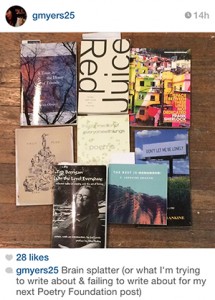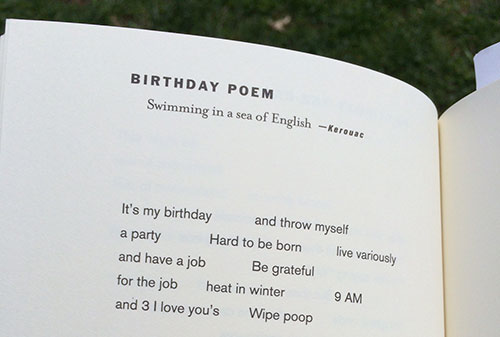In This Connection of Everyone With Lungs, Juliana Spahr’s “Poem Written from November 30, 2002 to March 27, 2003” opens with a litany of thoughts upon waking in the morning to the sound of parrots overhead. However, the awakening is not so calm as it is not just awakening to the parrots, but awakening to everything else that is happening in the world:
When I speak of the parrots I speak of all that we wake to this morning, the Dow slipping yet still ending in a positive mood yesterday, Mission Control, the stalled railcar in space, George Harrison’s extra-large will, Hare Krishnas, the city of Man, the city of Danane and the Movement for Justice and Peace and the Ivorian Popular Movement for the Great West, homelessness and failed coups, few leads in the bombing in Kenya.
The following stanzas continue to list ongoing global events and tragedies. It concludes that political, military, and development problems have “entered our bed at night holding us down sleepless.” I first read this book in the summer of 2005, which is also when I first read Claudia Rankine’s Don’t Let Me Be Lonely. I saw a parallel between the two—in the parrots/thoughts that enter the bed at night to hold people down and with Rankine’s argument against Dickinson that “hope was never a thing with feathers.” Rankine writes of a “deepening personality flaw: IMH, The Inability to Maintain Hope, which translates into no innate trust in the supreme laws that govern us.”

Both writers get at the paralyzing effect of feeling hopeless in the wake of all that is going on in the world. Both struggle with how to live in the face of it all. And this struggle is of great interest to me because I don’t know now, nor have I ever known, how to live.
In a workshop at the Jack Kerouac Conference in 1982, Ted Berrigan said, “Survival is the hardest test for the poet.” At the time, he’s specifically speaking financially, saying that it is extremely difficult to make a living as a poet. Because of this, he says, most poets have to have a job in addition to writing poems, and some will find that because of this they’ll stop writing poems. For me, the question of survival is not just how to survive as a poet, but how to survive as a human in the world—how do we persist? It’s a how can we-go-on/what-makes-a-life-worth-living kind of thing. Or, how can we not fall victim to the inability to maintain hope?
One of my favorite books of poetry from 2014, Ryan Eckes’s Valu-Plus captures the daily struggle of living, where we are complicit in the terrible things that happen, where we have blood on our hands (he writes, “yes, there is blood on / your hands—you’re american— / that’s what you mean / every time you say / “get over it”). In “What Are You Swinging At,” Eckes writes about poets hanging out at a bar to hear Hoa Nguyen read:
and hoa nguyen’s at the microphone
telling us about chinaberry trees in
austin texas, how they grew on her.
and she grows on us. poetry on poets,
drinking this drink. then some of us
fight about how to live in a fucked
world and i lean back against the wall—
i don’t know how to live, i whisper
to hoa who laughs in half the question
and i’m here for a minute.
Eckes states it bluntly—he doesn’t know how to live in a fucked up world, but then through friendship and laughter he’s jarred into the present. This being “here,” if only for a minute, is, I think, what is important right now. At least, it’s the only answer I have come up with so far about how to go on—to be present. To attempt to live fully. To engage with all of it—the good, the ugly, the devastating.
After Michael Brown was murdered, I found Nina Simone particularly poignant, which I’ve written about previously at Coldfront Magazine. “Ain’t Got No / I Got Life” feels revolutionary to me because of its personal reclamation of the self, and the song connects to poetry and the grounding I experience reading it—not just grounding the self in the body as I mention at Coldfront—but grounding on the everyday level too. That there are so many ways I feel lucky to have found poetry in my life, that without it I don’t know how I would go on.
Simone’s music doesn’t only serve for me as an amulet against the current evils of the world (which are also the old evils), it also just plain feels good to listen to. In his book Space Between These Lines Not Dedicated, Philadelphia poet laureate Frank Sherlock repeats the refrain “you can feel good,” which serves as a nice reminder that despite it all it’s okay to allow one’s self to feel good, and there are all kinds of things one can feel good about. Among the things you can feel good about, Sherlock lists, “rocking black lip liner,” “life in this ditch since you know your future starts here,” and “beating the Giants.” But perhaps what feels most pertinent to this idea of how to go on is his statement, “You feel good about showing your exit wounds because of what you’ve held onto.”
I don’t know how to live, but I can feel good about getting this far.
These past few weeks I have been reading Hoa Nguyen’s Red Juice: Poems 1998-2008. Generally when I read books, I try to read through them as fast as I can out of a concern that my free time out of work only allows so little time and yet there’s so much I want to read. However, I’ve been enjoying taking my time with Nguyen’s collection—is that a slow poetry practice? I’m not sure. But I arrived at her book Hecate Lochia on the first nice day of spring where I could read outside during my lunch hour, when I was already consciously thinking about what it might look like to write about “how to live,” or rather not knowing how to live. Her “Birthday Poem” opens:

I feel right there with Nguyen, minus the three I love you’s. It is hard to live variously and have a job—this is, again echoing Berrigan, a hard test for the poet. And yet there is a balance for Nguyen—there’s family alongside the shit (both literally and metaphorically), and later in the poem there is beer and sandwiches too.
K. Lorraine Graham’s The Rest Is Censored also takes a look at the day and what one does to get through it. And it captures concern of not wanting what is expected: “Wake up in a panic / about real estate / about not wanting it.” It also captures a life lived variously, which includes panic as well as connection to others and beauty:

Graham’s book is another one that I have been reading on my lunch break at work recently. The wide-ranging exploration of a life reminded me that there are so many others (perhaps all poets?) who are trying to figure out how to live, and while they may not arrive at any answers, the journey is well worth it.
The Rest Is Censored reminds me of Fanny Howe’s essay “Bewilderment,” where she offers one possible definition of the lyric: “[I]t is a method of searching for something that can’t be found. It is an air that blows and buoys and settles. It says, ‘Not this, not this,’ instead of, ‘I have it.’” Howe describes serial poems as spirals, and writes of the spiral-walker, “[T]here is no plain path, no up and down, no inside or outside. But there are strange returns and recognitions and never a conclusion.” Poetry makes sense to me for this reason: it is willing to raise questions and be happy to not arrive at answers.
Further, poetry lives variously, generously, and defiantly. Despite everything working against the poet, the poet persists and stands as witness. Akilah Oliver’s “In Aporia” concludes:
I too have admired the people of this planet.
Their frilly, ordered intellects.
The use they’ve made of cardamom,
radiation as well. How they’ve pasteurized milk, loaned surnames to stars,
captured tribes, diseases, streets, and ideas too.
A poem about death and doubt ending in this sort of graciousness to the variety of the world, from frivolous to more significant and terrible things, seems to be telling me something about how to live. To bear witness. To take it all in.
I still don’t know how to live.


